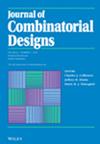Doubly Orthogonal Equi-Squares and Sliced Orthogonal Arrays
IF 0.8
4区 数学
Q3 MATHEMATICS
引用次数: 0
Abstract
We introduce doubly orthogonal equi-squares. Using linear algebra over finite fields, we produce large families of mutually -doubly orthogonal equi- squares, and show these are of maximal size when . These results specialize to the results of Xu, Haaland, and Qian when and the equi-squares are Sudoku Latin squares of order . Further, we show how a collection of mutually -doubly orthogonal equi- squares can be used to construct sliced orthogonal arrays of strength two. These orthogonal arrays have important applications in statistical designs.
双正交等平方和切片正交阵列
我们引入双正交等平方。利用有限域上的线性代数,我们得到互qs的大族——双正交的等qr+ s的平方,并证明当s≤r + 1时它们是最大的。这些结果集中于Xu, Haaland,当r = s = 1时,其等方为q阶数独拉丁方阵2 .此外,我们展示了一个相互q - s -双正交相等q - r的集合+ s平方可以用来构造强度为2的正交切片阵列。这些正交阵列在统计设计中有重要的应用。
本文章由计算机程序翻译,如有差异,请以英文原文为准。
求助全文
约1分钟内获得全文
求助全文
来源期刊
CiteScore
1.60
自引率
14.30%
发文量
55
审稿时长
>12 weeks
期刊介绍:
The Journal of Combinatorial Designs is an international journal devoted to the timely publication of the most influential papers in the area of combinatorial design theory. All topics in design theory, and in which design theory has important applications, are covered, including:
block designs, t-designs, pairwise balanced designs and group divisible designs
Latin squares, quasigroups, and related algebras
computational methods in design theory
construction methods
applications in computer science, experimental design theory, and coding theory
graph decompositions, factorizations, and design-theoretic techniques in graph theory and extremal combinatorics
finite geometry and its relation with design theory.
algebraic aspects of design theory.
Researchers and scientists can depend on the Journal of Combinatorial Designs for the most recent developments in this rapidly growing field, and to provide a forum for both theoretical research and applications. All papers appearing in the Journal of Combinatorial Designs are carefully peer refereed.

 求助内容:
求助内容: 应助结果提醒方式:
应助结果提醒方式:


